Contents

Curcumin is a yellow powdery substance that is extracted from turmeric, also known as curry spice. It was discovered by the scientists Vogel and Peltier in 1842.
Curcumin has the ability to reduce inflammation, destroy cancer cells, acts as an antioxidant, promotes the speedy recovery of tissues. According to scientific studies, curcumin can be used to treat neurodegenerative and psychiatric disorders. What is this “medicine” curcumin?
Health Benefits of Curcumin
Numerous studies have proven the enormous benefits of curcumin and its impact on our health. We’ll look at the most important properties below.
For the brain
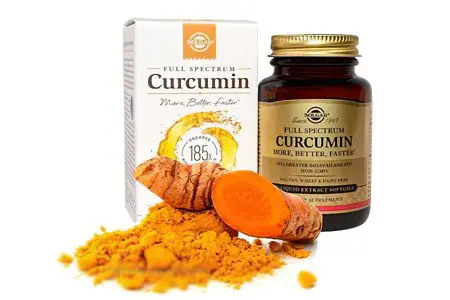
Curcumin has a pronounced anti-inflammatory effect, thanks to which it protects the brain from degenerative processes. Scientists have proven that the substance helps to reduce anxiety, activates the growth of nerve cells and increases the neuroplasticity of neurons. [1]
BDNF or brain-derived neurotrophic factor in the human body is responsible for the growth and strengthening of nerve connections, which has a positive effect on memory and other cognitive processes. Experimentally, it was possible to prove that under the influence of turmeric this factor becomes more active. [2]
Depression
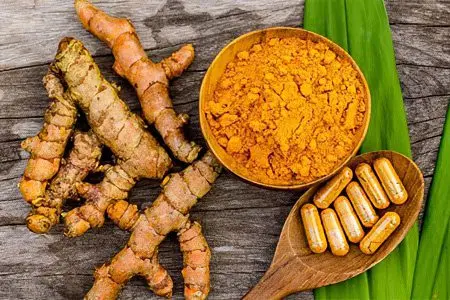
Scientists today do not know for certain why taking curcumin helps to get rid of depression faster. Perhaps a positive effect develops due to a specific mechanism of action, or due to a whole complex of neurophysiological reactions. However, the antidepressant effect of taking curcumin is a proven fact. Supplements containing it have the following effects on the brain:
The level of BDNF rises. Its decrease is characteristic of all diseases of the nervous system, including depression. The growth of neurotrophic factor contributes to improved mood and overall well-being. [3]
Modulation of the HPA axis (hypothalamic-pituitary-adrenal system). With depression, its activity increases, and under the influence of curcumin it normalizes.
Increasing serotonin levels, norepinephrine and dopamine. [4]
Recovery of mitochondrial functionresponsible for energy production in cells. With depression, their work is disrupted, and taking curcumin allows you to neutralize this failure. [5]
Vitaminization of the body, increased antioxidant activity. Scientists believe that depression develops against the background of a deficiency of vitamins, which act as antioxidants. There is evidence that curcumin reduces the intensity of oxidative stress and reduces the harmful effects of reactive nitrogen species on the body. [6]
In clinical studies, 1000 mg of curcumin per day has been found to improve mood and help fight chronic depression. Enhances the therapeutic effect of piperine. Its joint use with curcumin allows you to get rid of increased anxiety (a study was conducted with the participation of patients suffering from obesity and depression). At the same time, patients do not develop side effects, which favorably distinguishes curcumin from classical antidepressants. These, in turn, lead to insomnia, sexual dysfunction, hyperarousal, and suicidal thoughts. [7], [8], [9], [10].
For Alzheimer’s disease
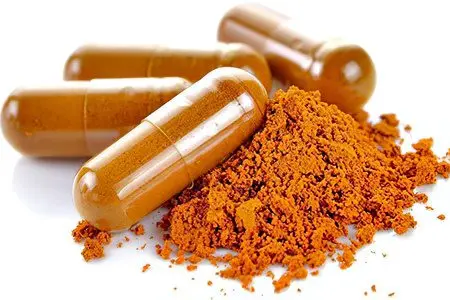
Alzheimer’s disease is characterized by memory loss, deterioration of all mental abilities, and the development of dementia. Pathology is widespread throughout the world, but an effective cure for it has not been found.
Recent studies have established that curcumin improves cognitive function in all patients with Alzheimer’s disease.[11], [12].
Positive dynamics is observed due to the following effects:
Normalization of insulin signaling pathways, which helps to improve thought processes and memory.
Improvement of synaptic signals (contacts between neurons).
Decreased brain inflammation. It has been established that in Alzheimer’s disease it develops against the background of the formation of beta-amyloid plaque. Curcumin helps reduce the intensity of the inflammatory response, prevent and reverse the loss of synapses caused by neuronal oxidation.
Suppression of the production of acetylcholinesterase. Acetylcholine is an essential neurotransmitter that is responsible for the normal course of cognitive processes. In Alzheimer’s disease, its level is reduced due to the high production of acetylcholinesterase. The intake of curcumin prevents its synthesis, due to which a pronounced therapeutic effect develops. By the way, all medicines used to combat Alzheimer’s disease have the same effect.
With Parkinson’s disease
Parkinson’s disease is associated with the development of dementia and severe motor impairment. It develops against the background of a number of factors, including: the accumulation of toxins, inflammation, damage to dopamine neurotransmitters in the brain.
In the course of scientific research, it was found that curcumin increases the lifespan of brain cells by improving mitochondrial function. In parallel, there is a decrease in the intensity of the symptoms of Parkinson’s disease, which is possible due to a decrease in the loss of dopamine. [13], [14].
Fast recovery after a stroke
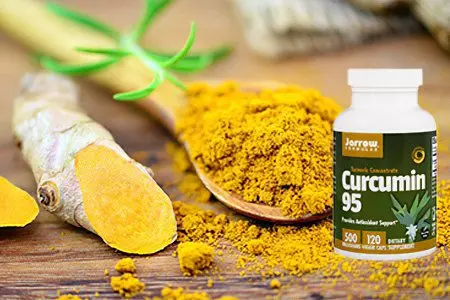
Violation of the blood supply to the brain leads to the development of ischemic stroke. Cells become inflamed and die. After providing emergency medical care, efforts should be made to ensure normal nutrition of the damaged area of the brain. However, against the background of existing inflammation and oxidative stress, reperfusion syndrome may develop in previously ischemic tissues.
Taking curcumin helps reduce the risk of reperfusion syndrome, as well as minimize the negative impact of stroke on the brain. Its cells recover and regenerate faster, the severity of their oxidative damage decreases at the stage of restoration of blood flow. [15], [16].
It is no secret that the process of brain cell recovery after a stroke is always accompanied by an inflammatory reaction. Curcumin helps to restore the activity of mitochondria, reduce the intensity of inflammation, reduce the area of tissue death, and remove swelling from them. [17]
Studies have found that curcumin, taken prophylactically, can reduce the damage caused by stroke.
Neuroprotective effect

The benefits of curcumin also come down to faster regeneration of brain cells after trauma, it prevents the development of inflammation and oxidative stress. This fact has been proven experimentally. The study was conducted on rats. [18]
Curcumin is useful for people who abuse alcohol. The substance prevents damage to the brain by toxins, protects neurons from death, inflammation and injury. In general, the effects of any acute brain injury will be less pronounced if the person has previously regularly consumed curcumin. The substance protects not only the brain, but also liver cells from alcoholic degeneration. [19]
Improving the neuroplasticity of the brain
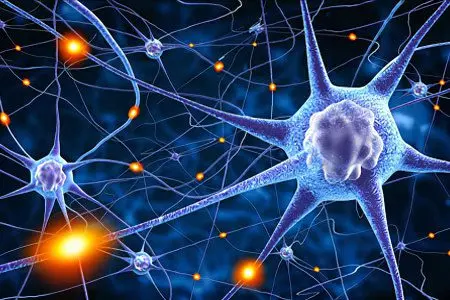
Curcumin is good for the brain due to its ability to improve its neuroplasticity. This was proven experimentally back in 2017. [20]
Neuroplasticity is a feature of the human brain that allows it to restore lost connections after suffering damage, as well as adapt to changing environmental factors. It is this property that underlies learning. To ensure neuroplasticity, the brain must produce neurites, which form dendrites. They form neurons responsible for the transmission of nerve signals.
If the process of neurite growth is disturbed, the likelihood of developing Alzheimer’s disease, Parkinson’s disease, as well as depression and even stroke increases. The lack of normal communication between nerve cells contributes to a decrease in cognitive capabilities.
Curcumin accelerates the growth of neurites, reduces the negative effects of stress and trauma on the brain. Its consumption improves memory and other cognitive abilities. [21]
Antioxidant properties of curcumin
Free radicals and oxidizing agents, as they accumulate in the body, have a negative effect on cells, as a result of which the functionality of internal organs is disrupted. As a result, a person suffers from chronic inflammatory processes, ages faster, develops heart disease, and increases the risk of developing cancerous tumors.
The body has its own defense against free radicals, but as its reserves are depleted, these abilities decrease. A number of studies have found that curcumin can neutralize oxidants, preventing them from damaging cells. It prevents dangerous transformations of lipids, superoxides and radicals. [22], [23], [24].
For sight
The substance can be taken during therapy for certain ophthalmic diseases. Curcumin is effective in the treatment of uveitis, in which the blood vessels that feed the eyeball become inflamed. It acts like corticosteroid hormones. In addition, curcumin prevents the development of cataracts caused by exposure to chemicals. [26], [27], [28].
Curcumin in sports
Some properties of curcumin are useful for sports, for this reason, sports supplements based on it are created.
For muscle recovery
Curcumin accelerates the process of muscle regeneration. The effect is achieved due to the influence of curcumin on cytokines. These substances are actively involved in all inflammatory processes. The cytokine interleukin-6 stimulates muscle growth, and the cytokine TNF inhibits this process. Curcumin enhances the effect of interleukin-6 and suppresses TNF, due to which the process of muscle tissue repair is accelerated.
Promotes the release of insulin
Insulin is one of the most important catabolic hormones. Curcumin not only helps to maintain normal insulin levels, but also improves insulin resistance. In one study, people who drank 1,5 g of curcumin every day for six months, decreased vascular stiffness, increased cellular sensitivity to insulin, and decreased triglyceride and uric acid levels. In addition, the amount of visceral and total body fat decreased. (see benefits for diabetics)
Fighting lactic acid and inflammation
Lactic acid is a by-product released in the muscles during strenuous exercise. It is she who causes pain in the muscles in the first 12 hours after training. Curcumin plays the role of a powerful antioxidant, reducing the intensity of oxidative stress and inflammatory reactions, preventing them from damaging cells, and prevents dangerous transformations of lipids, superoxides and radicals. (see antioxidant properties of curcumin)
Promotes weight loss
Curcumin is also useful for weight loss, as it causes the body to absorb its own fat stores, preventing the cells from capturing excess energy from food. It reduces the body’s resistance to insulin, so that the cells absorb enough nutrients and properly process them. As a result, the person loses weight. [25]
The benefits of curcumin for the heart
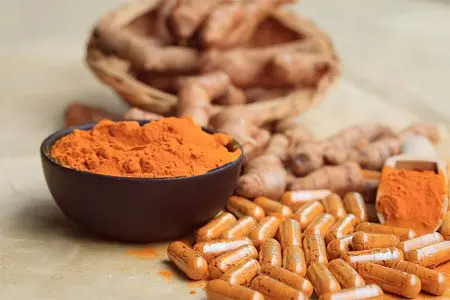
Physical activity is beneficial for the heart muscle, as it increases the functionality of its tissues. Scientists have found that curcumin brings the same benefits to the heart as regular exercise. In particular, we are talking about improving the function of the endothelium.
Curcumin reduces many of the risk factors for heart disease, including:
Atherosclerosis.
Chronic inflammatory processes.
High blood glucose.
High cholesterol.
Metabolic syndrome plays a particular danger in terms of the development of a heart attack. With it, abdominal obesity, high blood pressure, lipid metabolism disorders and glucose intolerance are observed. [29] Against the background of obesity and high blood sugar, blood vessels wear out quickly.
Curcumin has the following positive effects:
Reduces inflammation in the body.
Normalizes lipid metabolism.
Prevents damage to blood vessels in people with diabetes.
Eliminates the harmful effects of glucose on the body.
Removal of inflammation
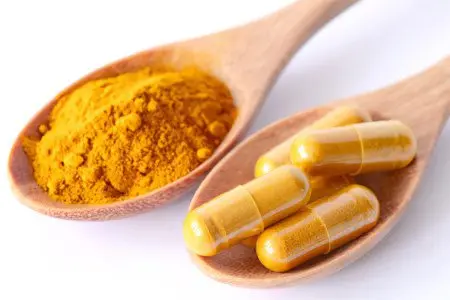
Against the background of obesity and metabolic syndrome, a chronic inflammatory reaction is observed in the body. All tissues suffer from oxidative stress. Inflammation can lead to damage to DNA, proteins, and other critical units of the cell. As a result, the health of the body as a whole is undermined. Chronic inflammation leads to accelerated aging of all tissues. To protect the heart, blood vessels and internal organs, it must be stopped.
In 2015, a study was conducted involving patients suffering from metabolic syndrome. In it, one group of people took a placebo, and the other – 1 g of curcumin per day. It has been fortified with piperine to improve absorption. After 2 months, people who took curcumin saw a decrease in the intensity of oxidative stress and inflammatory response, as well as increased immunity. [30]
Several other studies have recently been completed. Scientists have confirmed that consumption of 1 g of curcumin with piperine helps to reduce the level of cytokines (signaling molecules), due to which the body maintains a chronic inflammatory response. [31], [32].
Improved lipid metabolism
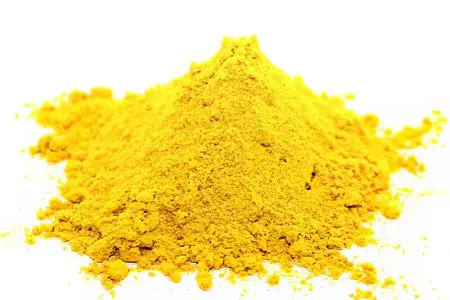
Lipid metabolism disorders are accompanied by an increase in triglyceride levels and a decrease in HDL levels. Excess cholesterol in the blood is a direct path to the development of atherosclerosis, heart attack and stroke.
Reception of curcumin leads to the normalization of lipid metabolism. Experimentally, it was found that the intake of 1 g of curcumin per day contributed to a decrease in the level of bad cholesterol and triglycerides and an increase in HDL. [33]
Curcumin helps to remove cholesterol from the liver, improves the transport of HDL to cells, has a positive effect on its absorption from food, and the removal of triglycerides from the body. [34]
Curcumin has the ability to neutralize active oxygen, which enhances lipid oxidation and leads to the formation of plaques, blockage of blood vessels and poor blood flow. [35]
Benefits for diabetics
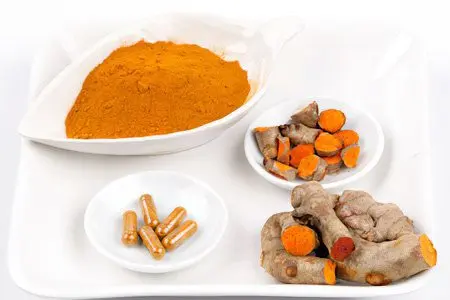
People with diabetes are 3 times more likely to die from heart and vascular disease than people with normal blood sugar levels. Curcumin not only helps maintain normal insulin levels, but also helps reverse the processes that destroy the cardiovascular system.
One study involved people with type 2 diabetes who drank 1,5 grams of curcumin every day. The second group received a placebo. The experiment lasted six months. People who took curcumin showed improvements in arterial stiffness, increased cellular sensitivity to insulin, and decreased triglyceride and uric acid levels. In addition, the amount of visceral and total body fat decreased. [36]
Curcumin prevents damage to small vessels, reducing the risk of developing diseases of the kidneys, heart, limbs, retina.
Cancer and Curcumin
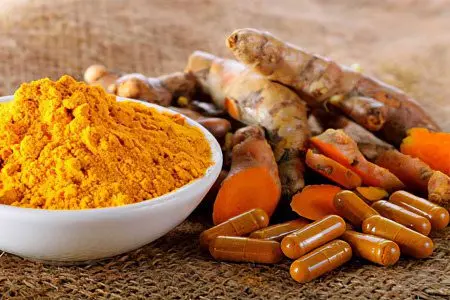
Curcumin promotes the death of cancer cells and increases the effectiveness of treatment. The main effect of curcumin on oncological processes:
Prevents uncontrolled division of cancer cells and their proliferation in the tissue.
Promotes apoptosis of cancer cells. Apoptosis is a program of the body that is aimed at eliminating dysfunctional cells. Cancer cells lose this ability, but due to the influence of curcumin, their death still occurs.
It prevents the spread of growth factors, thereby preventing cancer cells from multiplying.
Stops the inflammatory process in the body, blocks the transcription factor NF-kB, slowing down the growth and development of the tumor.
Curcumin inhibits the reproduction of cancer stem cells, thereby preventing the formation of new tumors and increasing the effectiveness of ongoing chemotherapy.
Strengthens the immune system, increasing the body’s natural resistance.
Side effects of curcumin

Side effects develop when curcumin is taken in excess dosages. Most often, people experience nausea and diarrhea. Other negative symptoms include:
Blood thinning. Curcumin prevents it from rapidly clotting, which can cause bruising and even lead to bleeding. Therefore, they refuse to take it at least 14 days before the upcoming operation.
Diarrhea. Curcumin in excess dosage irritates the organs of the digestive system, leads to pain in the abdomen and thinning of the stool. For this reason, it is not recommended to take it on an empty stomach.
Flatulence. This side effect develops in 4 in XNUMX people who take curcumin. With increased gas formation, it is recommended to reduce the dose, as well as consume it after meals.
Decreased blood sugar levels. If a person takes drugs to treat diabetes, there is a risk of developing hypoglycemia.
Anemia. In theory, there is a chance of developing an iron deficiency if a person already has such a problem.[37]
Curcumin: instructions for use
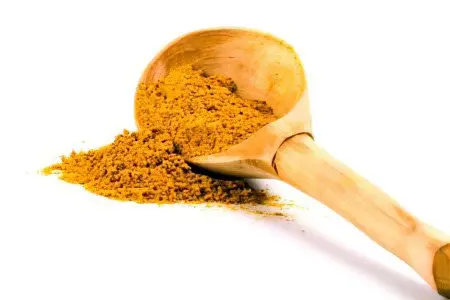
How to take curcumin? Since it dissolves in fat, it is recommended to take it with fatty foods. An excellent addition is coconut or olive oil, milk and yogurt. Curcumin can be added to tea with milk.
If you buy curcumin as a food supplement, the capsules, powder, or tincture may already contain piperine. The manufacturer takes care of this.
To increase the bioavailability of curcumin, a liposomal supplement, lecithin, fish oil, bromelain can be used.
dosage
Osteoarthritis: 400-600 mg 3 times a day.
Digestive disorders: 500 mg 4 times a day.
Rheumatoid arthritis: 500 mg 2 times a day.
Improvement of liver function: 3 g 3 times a day. The course of treatment is 3 months.
Improving the work of the cardiovascular system: 150 mg 1 time per day. The course of treatment is 2 months.
Weight loss: 400-600 mg 3 times a day.
Increasing the antioxidant activity of the body 500 mg 1 time per day. The course of treatment is 3 months.
As a nootropic: 750 mg 3 times a day.
How long to take curcumin? This substance is easily tolerated, even single doses of 12000 mg do not cause any harm to the body. Therefore, it can be taken continuously for 2-3 months, after which it is advisable to take a break for 2 weeks.
What to Choose: Turmeric or Curcumin?
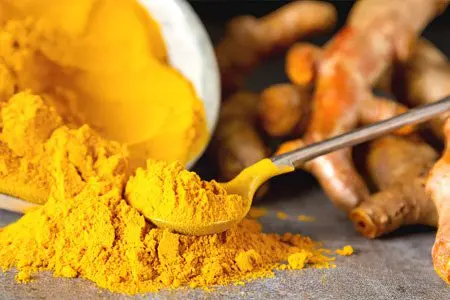
It is difficult to answer this question unambiguously. However, there have been studies that have compared turmeric and curcumin. Superiority in them remained with turmeric.
Turmeric root extract has been found to be better at reducing inflammation, having a more pronounced antioxidant effect, and better stimulating immune forces than curcumin. [37], [38]
Scientists suggest that whole turmeric supplements are more effective than curcumin-only supplements. It is good if the product is supplemented with liposomes or piperine (BioPerine), which increases the bioavailability of the main active ingredient.
Which curcumin is best?
Whichever form a person chooses, curcumin must be supplemented with piperine. Its source is black pepper. Piperine has been shown to increase the absorption of curcumin by 2000%.
“Natural” food supplement E100 – is it useful?
Food supplement E100 is a natural dye curcumin, which is extracted from the turmeric plant. To obtain it, the root is ground into powder, extracting it with petroleum ether and alcohol. The result is a substance with a pleasant taste and aroma. However, one should not hope that this supplement provides any health benefits, although many manufacturers fall for tricks. They mix E100 into their product, after which they write that it is “completely natural.” As a result, consumers are given a false sense of benefit.
E100 is not just a dye. The additive has a bitter aftertaste, with the help of which manufacturers act on human receptors, causing him to become addicted to certain products. The dye is added to meat, confectionery, spirits, cheeses, butter, mustard. The goal is the same – to give the product a sharp taste and a bright color that he will not forget, which means he will buy it again and again.
Conclusion
Curcumin prevents oxidative processes in the body, allows you to maintain the health of the heart, blood vessels and brain. It is effective in the treatment and prevention of depression, neurodegeneration, stroke, obesity, cancer and more. Numerous studies confirm this.
[Video] Curcumin! When too lazy to drink a lot of supplements.
Информация не являются руководством по лечению и диагностике, не заменяет консультации с врачём.
Автор статьи ↓









